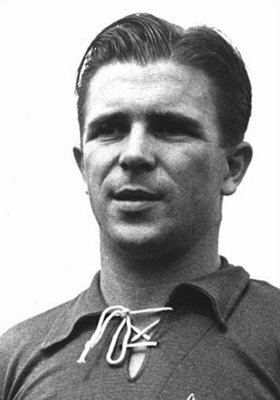 Ferenc Puskas was the chief magician of the so-called Magical Magyars, the great Hungarian team of the 1950s that dominated world football.
Ferenc Puskas was the chief magician of the so-called Magical Magyars, the great Hungarian team of the 1950s that dominated world football.Puskas was an odd-looking footballer. He was short, stocky, barrel-chested and overweight, could not head the ball and could use only his left foot.
But what a left foot.
When he came to Wembley in 1953, no one in Britain had seen ball skills like his before. His stunning footballing ability left England captain Billy Wright tackling air at Wembley and helped Hungary thrash England 6-3, their first defeat on home soil.
Tom Finney, who watched the game from the stands, spoke for everyone when he said: "I came away wondering to myself what we had been doing all these years."
Puskas was known as the 'Galloping Major', a reference to the fact that he played for an army team, Honved. In his first season he scored 50 goals as he won the first of five Hungarian championships and in total scored 357 goals in 354 games.
He made his international debut at the age of 18 and went on to score a phenomenal 83 times in 84 internationals. Disappointment came when West Germany caused a major upset by defeating Hungary in the 1954 World Cup Final.
The Hungarian uprising against their Soviet masters in 1956 led to the disintegration of the great national side. Puskas was with the rest of his Honved team-mates in Spain when the revolt took place. He defected to the West and within a year had been signed by Real Madrid, then Europe's leading club.
Puskas proceeded to form a sensational partnership with Alfredo Di Stefano and they became the heart of an outstanding Real side. The high point of their achievements was their display in the 1960 European Cup final in front of 135,000 at Hampden Park.
In a truly memorable match, Real Madrid defeated Eintracht 7-3. Di Stefano scored a hat-trick, Puskas went one better with four.
However, Puskas did not have it all his own way in the European Cup. In 1962 he scored a hat-trick in the final against Benfica but Real still lost 5-3 to their Portuguese opponents.
There was more disappointment a year later when Puskas, now playing for Spain, failed to inspire his team to success in the World Cup Finals in Chile. Spain finished bottom of their group and Puskas failed to score in any of his four appearances for his adopted country.
But for Real his scoring rate of 512 goals in 528 matches helped the club win five successive league titles as well as three European titles.
Puskas left Real in 1966 to concentrate on coaching. He had mediocre success until 1971 when he took the Greek side Panathinaikos to the European Cup Final, where they lost 2-0 to Ajax.
After the Hungarian uprising Puskas had not returned to the country, but he was finally allowed back in 1993 to become caretaker manager of the Hungarian side during the World Cup qualifiers.
Puskas, who was admitted to hospital in late 2000 with arteriosclerosis and was later diagnosed with Alzheimer's disease, leaves a wife Erzsebet.
[source: BBC]

No comments:
Post a Comment